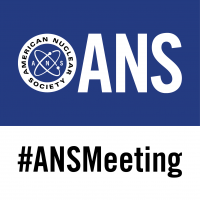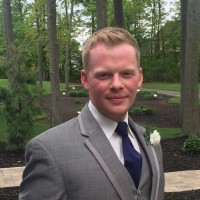First-Timers: On the Fence About Attending June Meeting? Here’s Why You Should Be There
 I was fortunate enough to have the opportunity to go to the American Nuclear Society meeting in Las Vegas in November 2016, although it was by happenstance. I had contributed to a paper that was to be presented at the meeting but the author was unable to attend, so I was sent instead. To be honest, at the time I was more excited, as a naïve college student, to get a university-sponsored trip to Las Vegas than by participating in the conference itself. What college student wouldn't jump at the opportunity to lose every cent of his single-digit bank account to a slot machine? I couldn't have been more wrong.
I was fortunate enough to have the opportunity to go to the American Nuclear Society meeting in Las Vegas in November 2016, although it was by happenstance. I had contributed to a paper that was to be presented at the meeting but the author was unable to attend, so I was sent instead. To be honest, at the time I was more excited, as a naïve college student, to get a university-sponsored trip to Las Vegas than by participating in the conference itself. What college student wouldn't jump at the opportunity to lose every cent of his single-digit bank account to a slot machine? I couldn't have been more wrong.
This was the first professional, large-scale conference I had ever attended as an undergraduate. I was not a nuclear engineer, but was a student in welding engineering. I had never taken advantage of the opportunity to attend a professional conference. True, I was interested in nuclear engineering and knew I would be going to graduate school, but I just assumed that any opportunity for careers, advice, or technical insight would come from my school. If I could go back in time and scold myself for not going to a professional conference before the ANS one last November, I would.
Imagine a time and place where big-name professionals in the industry whom you have read about are meeting to talk about cutting-edge findings, ideas, and problems facing said industry. Such places do exist, and for any nuclear professional it would be the ANS Annual and Winter Meetings. The meetings themselves are so much more than that, however. I would recommend that any student interested in nuclear engineering consider attending for the following reasons:
- Great Chance to Network: I know many would say that "this is a given," but the extent to which this can be done at an ANS meeting is second to none. I've been to my fair share of career fairs, and they pale in comparison to those you could meet at an ANS meeting. At your standard career fair, you will see many recruiters from HR departments from various companies, but I am sure that they get a little tired of having every student in the room give a formal greeting, ask a superficial question about the company, and hand them a resume, only to have another student come up and do the same thing. After a while, I am sure, everyone appears the same at a career fair and you can't really put yourself ahead. Compare this to an ANS conference, where you can directly seek out professionals in areas in which you are interested, get involved in a conversations with them about their work, and get career advice. I know a lot of students who either got jobs, internships, or an advisory role (if they were planning on going to graduate school) by simply attending and talking to people at these conferences. These opportunities would otherwise be nearly impossible if it weren't for the ANS meetings
- The Variety of Presentations: The main reason why most people attend an ANS meeting is to learn and hear about the work and research currently being done in the field. I've been to smaller conferences where similar sessions were held, but at those meetings there was only one session at a time. Everyone had to attend the same presentations and there was no choice in topic. This is where the ANS annual meeting was different. I was stunned at how many different sessions were going on at the same time. Each professional division within ANS sponsors different sessions related to their area of interest, and because of the variety of topics, you may find yourself bouncing around from session to session. It may feel overwhelming at times because there are so many sessions to attend and sometimes it's hard to keep up, but I know that I walked away having gleaned a bit of knowledge from the best and brightest out there. You can't get that anywhere else but from the ANS meetings.
- Lively Discussion and Debate: One of the most beneficial aspects I found for attending an ANS meeting is the new perspectives on things I can learn, simply by talking to people. A lot of this discourse occurs at the panel sessions, where a group of experts on a certain topic is asked to give opinions on an issue, with a Q&A session with audience members to follow. I attended a session on the future of the nuclear industry, which personally inspired me to write my roadblocks to nuclear series for the ANS Nuclear Cafe. I was surprised at just how many different opinions there were on what the future looks like, but I was equally impressed at the civility of the discussion. Because of this, it was easier for me as a newcomer to truly formulate my own opinion and to speak out, and to learn more about a topic to which I might otherwise have never been exposed. This again is a unique experience one might get only at an ANS conference.
I could go on listing various reasons to attend the meeting, but hopefully the above points illustrate the value one can get by attending. If you're a student like me and are concerned about the cost of the conference, fear not. ANS offers a student program to the first 70 students who register. Essentially, you become a student worker. You are refunded your registration fee for attending certain sessions where your work is to hand out sign-in sheets. This is truly a win-win, since you can sign up to work a session you are interested in, and also get your registration waived for doing so. It's a very generous program for students.
After my experience at the ANS winter meeting in 2016, without hesitation I signed up to attend the annual meeting in San Francisco. I not only expect that it will have just as much to offer as the winter meeting I attended, but it will also have many notable keynote speakers. If you are on the fence about whether or not to attend, I strongly advise that you do. You will be surprised by how much you will get out of it. Also, who can complain about going to go to San Francisco in June?
 Doug Hardtmayer is a graduate student studying nuclear engineering at The Ohio State University. His research is focused on pyroprocessing and fuel assessment. He is a member of the American Nuclear Society.
Doug Hardtmayer is a graduate student studying nuclear engineering at The Ohio State University. His research is focused on pyroprocessing and fuel assessment. He is a member of the American Nuclear Society.

